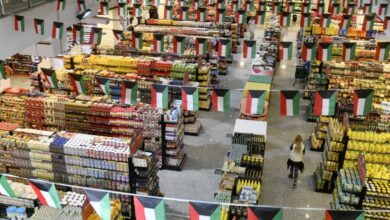Everything you need to know about Ramadan in ten quick answers
The word Ramadan is derived from the Arabic word ‘Ar-Ramd’, meaning intense heat, and is also linked to ‘Ramdha,’ which refers to sun-scorched sand. This name symbolizes the burning away of sins through fasting, purification, and devotion.

• Ramadan is one of the five pillars of Islam and is prescribed as an act of worship and spiritual purification through charity and good deeds. Fasting is meant to develop taqwa, a state of God-consciousness, piety, and self-restraint.
The ninth month of the Islamic calendar holds special significance for Muslims worldwide due to its unique blessings. The holy month of Ramadan has begun, during which fasting Muslims will abstain from food and drink from dawn to dusk to cultivate greater ‘taqwa’ (consciousness of God).
In this visual explainer, Al Jazeera answers ten common questions about Ramadan to help one better understand its significance and practices.
1. When is Ramadan this year?
Ramadan begins with the sighting of the crescent moon. This year, fasting began on March 1 in many countries, including those in the Middle East, Australia, Indonesia, Nigeria, and the Americas. Some other nations, such as Bangladesh, India, Malaysia, Pakistan, and South Africa, began observing Ramadan on March 2.
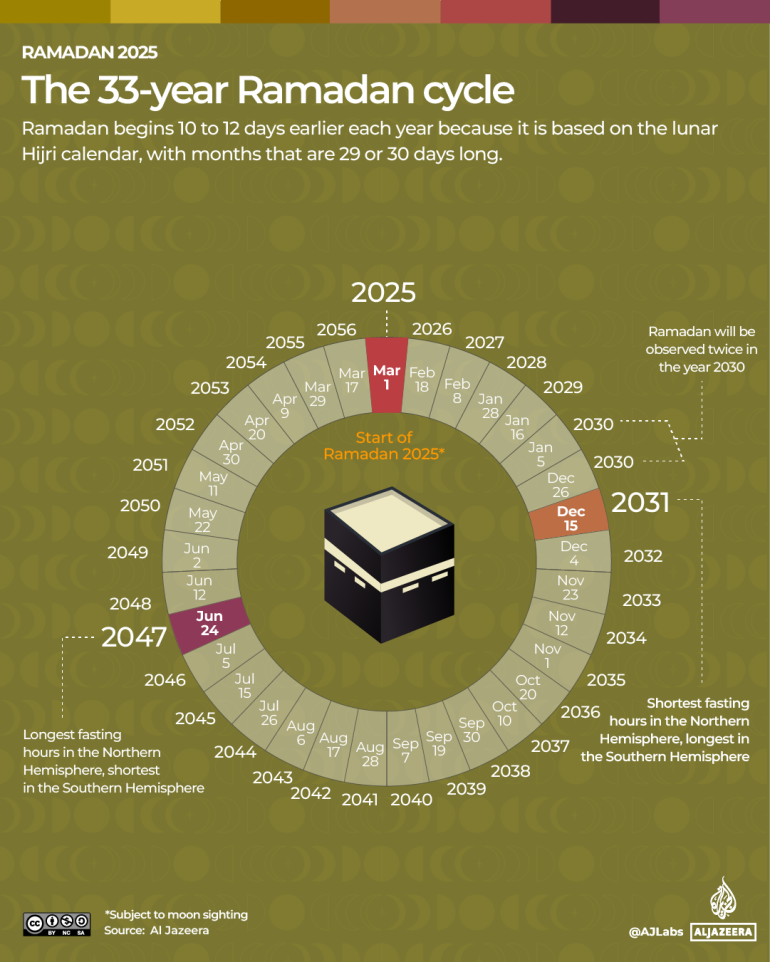
Because the Islamic calendar follows the lunar cycle, the start of Ramadan shifts 10-12 days earlier each year, completing a full rotation through all seasons approximately every 33 years.
Ramadan is expected to conclude on March 30 or March 31, marking the beginning of Shawwal, the 10th Islamic month.
2. Why do Muslims fast during Ramadan?
Ramadan is one of the five pillars of Islam and is prescribed as an act of worship and spiritual purification through charity and good deeds.
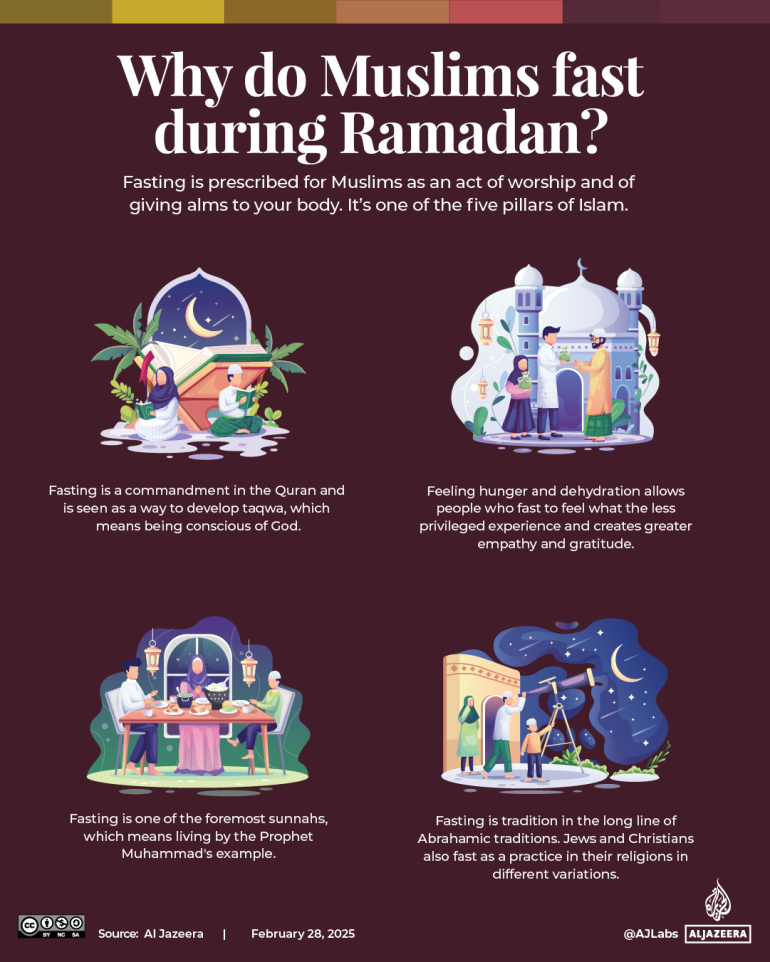
Fasting is meant to develop taqwa, a state of God-consciousness, piety, and self-restraint.
Experiencing hunger and thirst fosters empathy for the less privileged and cultivates gratitude. Fasting is a key sunnah (practice) of Prophet Muhammad and follows the long-standing tradition of fasting in Abrahamic religions, including Judaism and Christianity.
3. What are the rules of fasting?
A fasting person must refrain from eating and drinking from dawn until sunset. Additionally, smoking of any kind and sexual relations are prohibited during fasting hours.
Fasting aims to purify the soul, so anger, gossip, and inappropriate behavior should be avoided. Unintentional eating or drinking—such as forgetting and stopping upon remembering—does not break the fast.
4. Who is required to fast?
All able-bodied adult Muslims, male and female, are required to fast.
However, exemptions apply to:
- Those with chronic or incurable illnesses.
- Women during menstruation or pregnancy.
- Individuals with health conditions (e.g., diabetes) where fasting may be harmful or life-threatening.
- Travelers, who may choose to delay fasting and make up for missed days later.
- Children below puberty, though they are encouraged to practice as they grow older.
- Those unable to fast must either make up for missed days later or, if financially able, provide compensation by feeding a poor person for each missed day.
5. How do Muslims break their fast during Ramadan?
It is recommended to break the fast immediately at sunset with dates and water, following the teachings of Prophet Muhammad (PBUH)
Around the world, each culture has its own traditions for suhoor (pre-dawn meal) and iftar (sunset meal).
Dates, rich in vitamins, fiber, and antioxidants, provide a quick source of energy after a day of fasting.
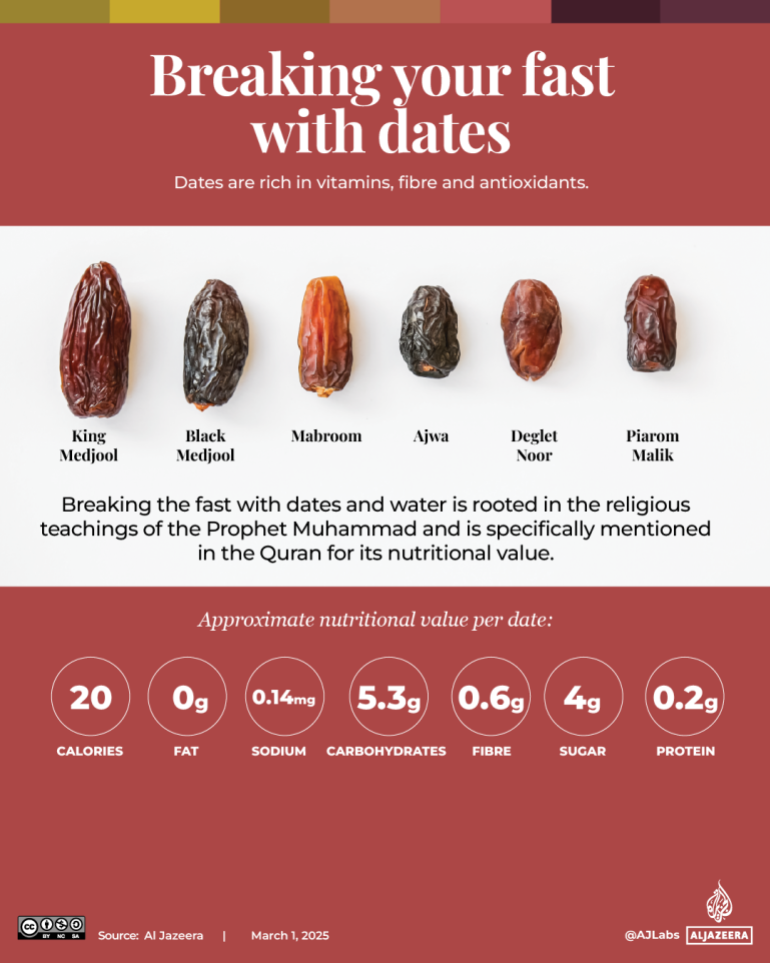
6. What is the connection between Ramadan and the Quran?
The Quran was first revealed to Prophet Muhammad in 609 CE during Laylat al-Qadr, also known as the Night of Decree or Night of Power, while he was in the cave of Mount Hira, located outside Mecca.
This event took place during Ramadan, though its exact date remains unknown. Most scholars believe it falls within the last 10 nights of Ramadan, specifically on one of the odd-numbered nights.
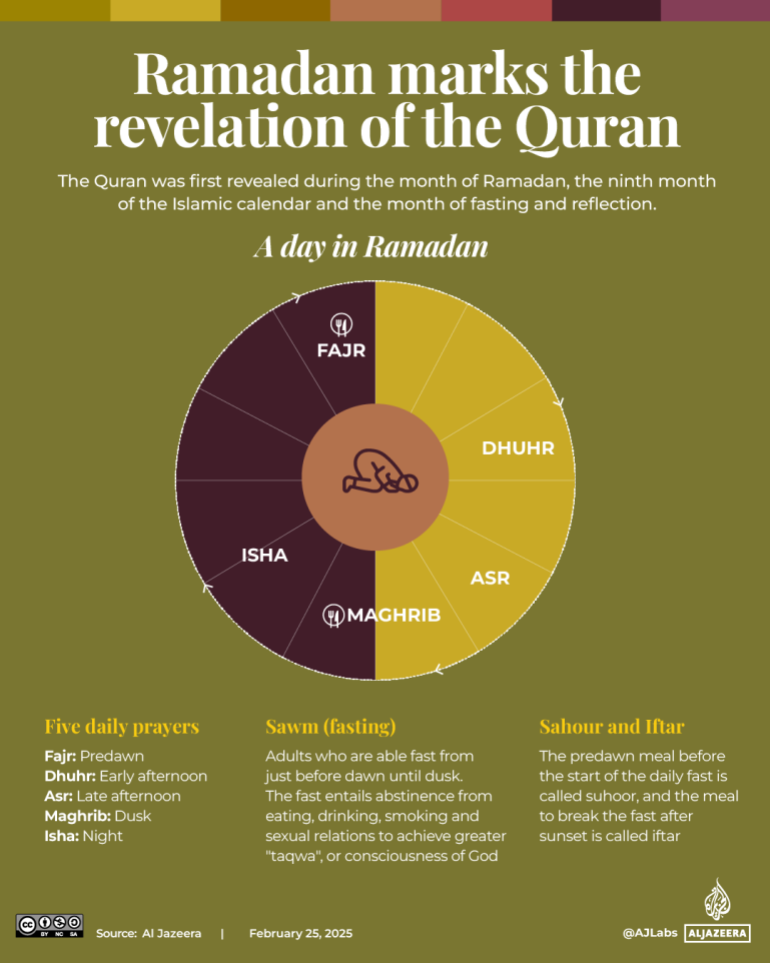
The Quran, revealed in Arabic, consists of 30 sections, 114 chapters, 6,236 verses, and 77,432 words. It mentions Ramadan in Chapter 2, Verse 185, outlining the prescribed rules for fasting and how to make up missed days.
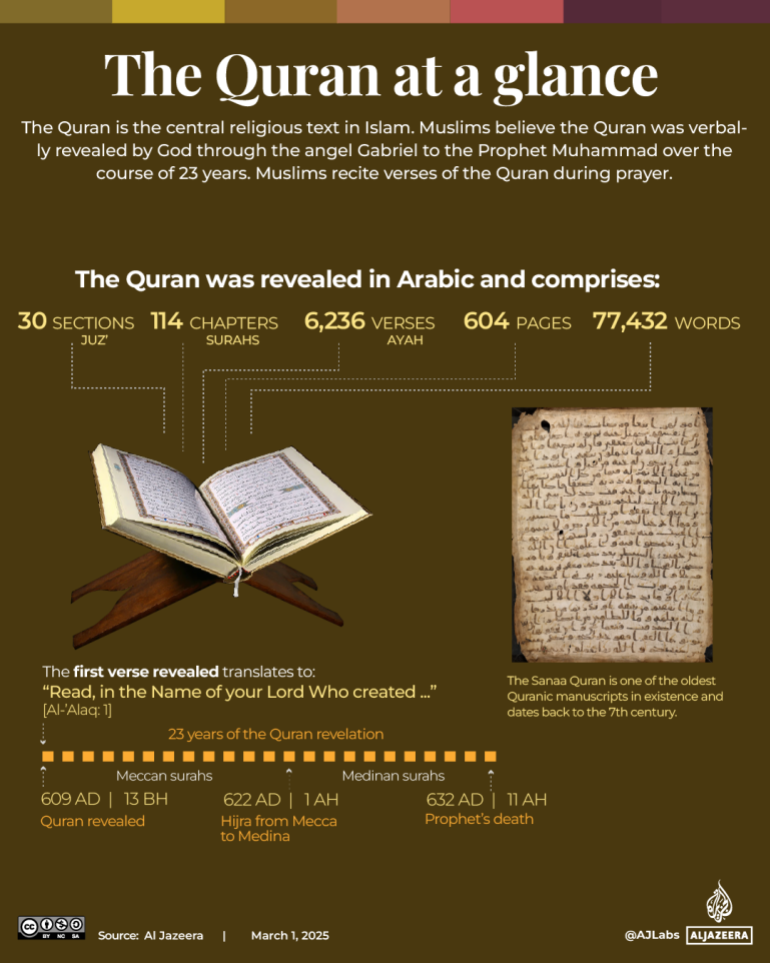
7. What happens during the last ten days of Ramadan?
Laylat al-Qadr is considered the holiest night of the year in Islam.
During the last ten nights of Ramadan, Muslims gather in mosques and increase their worship, seeking the immense blessings of Laylat al-Qadr through prayer, Quran recitation, and remembrance of God. Worship on this night is believed to be more rewarding than 1,000 months of devotion.
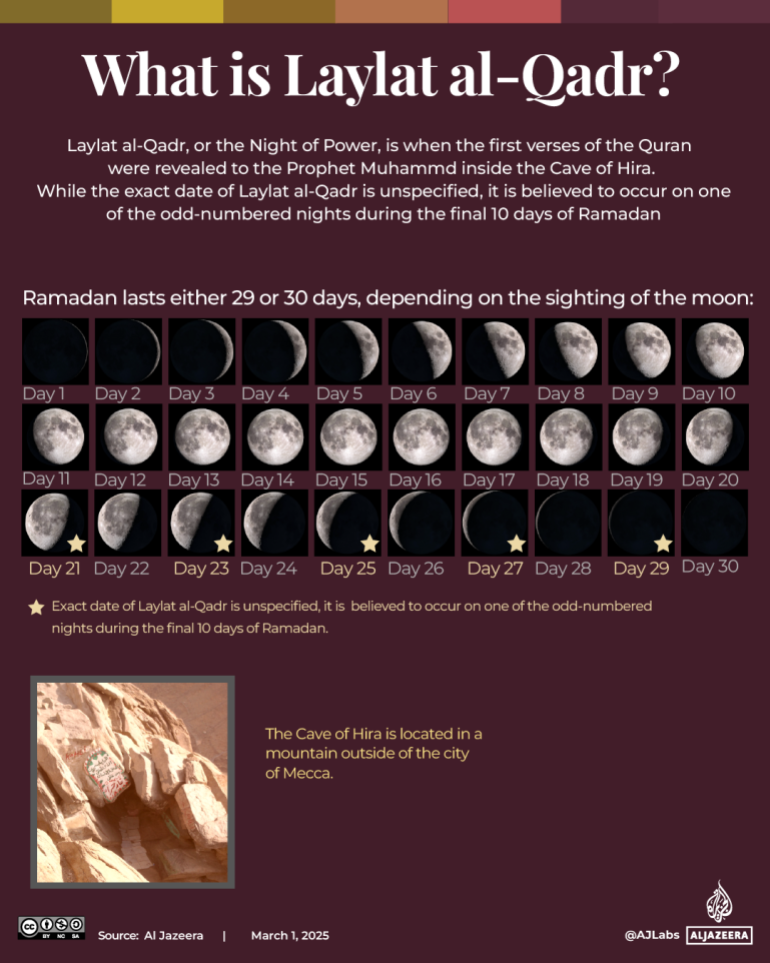
8. What does the word “Ramadan” mean?
The word Ramadan is derived from the Arabic word “Ar-Ramd”, meaning intense heat, and is also linked to “Ramdha,” which refers to sun-scorched sand.
This name symbolizes the burning away of sins through fasting, purification, and devotion. Some scholars believe the name originated when months were named based on seasonal conditions, suggesting that Ramadan initially occurred during an intensely hot period.
9. What are some Ramadan traditions?
Ramadan is a time for family and community, as loved ones gather for iftar, the evening meal that breaks the fast. It is a moment to share food, express gratitude, and strengthen family bonds.
Across the Middle East, homes and streets are decorated with colorful fanoos, traditional lanterns that add to the festive and spiritual atmosphere of Ramadan.
The fanoos tradition is believed to have originated in Egypt during the Fatimid Caliphate when residents of Cairo greeted the caliph at the start of Ramadan with lanterns. Over time, this custom spread to cities across the Islamic world, including Damascus, Aleppo, Ramallah, Gaza, Amman, and Riyadh, becoming a cherished symbol of Ramadan celebrations.
10. When is Eid al-Fitr?
The end of Ramadan is marked by Eid al-Fitr, a three-day celebration meaning “festival of breaking the fast.”
During Eid al-Fitr, Muslims attend special prayers, give charity, enjoy festive meals, visit family and friends, and exchange greetings and gifts.
Countries that began fasting on March 1 will observe Eid on March 30 or March 31, while those that started on March 2 are expected to celebrate on March 31 or April 1, depending on the sighting of the new moon.
Source: Al Jazeera













